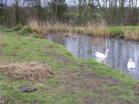Cupid's arrow strikes for lovelorn coscoroba swan
 Love is in the air at WWT Washington Wetland Centre, after a Valentine’s Day date turned into the real thing for a lovelorn singleton swan.
Love is in the air at WWT Washington Wetland Centre, after a Valentine’s Day date turned into the real thing for a lovelorn singleton swan.
Mrs Coscoroba before finding her mateFollowing a whirlwind romance, the centre’s female coscoroba swan - or Mrs Coscoroba, as she is affectionately known by staff – has been happily paired up with a new mate, following the death of her first partner in 2008.
As with many animals that pair for life, swans need a period of mourning when they lose of a mate, and after three years of solitude, Mrs Coscoroba had begun to show signs of pining for another beau.
So matchmaking wardens played cupid and arranged a date for their single lady, with two coscoroba males from WWT’s Martin Mere centre, in Lancashire.
Aviculture manager Owen Joiner said: “We had previously tried to introduce her to a young male, who she didn’t like, and then we brought in the two males from WWT Martin Mere.
“The boys arrived on Valentine’s Day and the old girl lined them up at the back fence and spent all afternoon inspecting them. By the following day she had selected her new mate and before long they were nest-building.
 The happy couple and their nest “Today you can see them swimming side-by-side and preening one another, while the male is regularly spotted diligently carrying potential nesting material to his other half, who carefully inspects it and places only that of the highest quality in her nest.
The happy couple and their nest “Today you can see them swimming side-by-side and preening one another, while the male is regularly spotted diligently carrying potential nesting material to his other half, who carefully inspects it and places only that of the highest quality in her nest.
“She has very high standards - but wouldn’t you after waiting so long to settle down and start a family!?
“The spurned suitor will be re-homed at another WWT centre shortly, where hopefully he’ll find true love of his own.”
Staff are now hoping that the loving couple will successfully produce eggs this season and complete their love story with the patter of tiny webbed feet. Watch this space!
Did you know?
The coscoroba swan is the smallest swan in the world (averaging 4.2kg in weight, 1m in length and 1.57m across the wings).
Coscoroba swans look more like geese because of their small size and the fact that their beaks don’t extend between their eyes, an area known as a ‘lore’ on other swans.
The species breeds in southern South America – from southern Chile and central Argentina, to Tierra del Fuego and the Falkland Islands – and flies north in the winter to central Chile, northern Argentina, Uruguay and the south east tip of Brazil.
It inhabits lagoons and swamps with plenty of vegetation, feeding mainly on grasses and small water plants, with the occasional mussel or fish.
Coscoroba swans have red feet and beaks and are completely white in their plumage, apart from the black tips of their outer six primary feathers.
Males and females are almost identical and live to an average age of 20 years.
The coscoroba swan’s population is estimated at around 10,000–25,000 birds.
The female coscoroba incubates the eggs, while the male stands guard and aggressively helps to protect the fledglings against predators after hatching. Coscoroba youngsters take a full year to mature, with mam and dad defending them throughout that period. As a result they tend to grow incredibly slowly, which means they stay cuter for longer!



